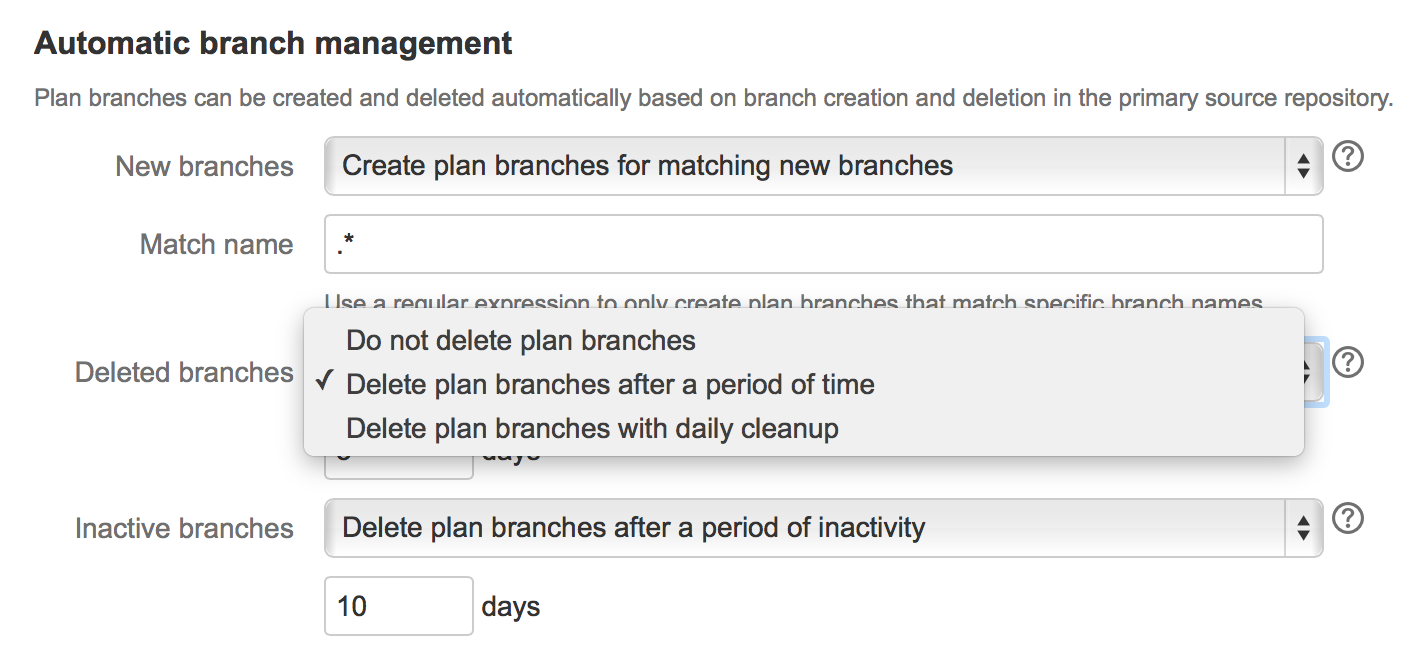Bamboo 5.9 release notes
Highlights
Manage your plan branches more efficiently
We've improved the plan branch management process and now you can create and delete plan branches automatically. Bamboo checks for changes in the primary source repository and takes actions based on the configuration details that you provided:
Customize Docker tasks
Now with the Docker run command, you can:
- use dynamic port mapping
- specify the container working directory and add additional arguments
- mount additional host directories as data volumes inside the container
AWS Code Deploy for Bamboo Server
The new AWS CodeDeploy task for Bamboo ensures smooth and safe application deployments to EC2 instances.
The task compresses a specified directory into a .zip file, uploads the file to Amazon S3, and starts the deployment.
The whole deployment process is tracked within AWS CodeDeploy where you can check information like deployment status, configuration, and health.
Easier AWS credentials management
Working with AWS is easy! You can now store your AWS credentials in Bamboo and reuse them in tasks that leverage shared credentials:
Bamboo Clover Plugin improvements
Automatic Clover integration for Maven tasks has been improved. Integration is tighter, thanks to which:
- the builds are faster, because the Maven build cycle is performed only once
- the problem with the compilation of multi-module Maven projects is fixed (BAM-13208)
However, it also means that automatic Clover integration will not run if a task calls 'mvn install' or 'mvn deploy' - this is to protect your builds from polluting repositories with instrumented code. This may require reviewing your builds having automatic Clover integration and changing them (to run 'mvn verify', for instance).
Automatic Clover integration for Grails tasks has also been improved. Integration now uses the BuildConfig.groovy or pom.xml file, instead of the grails install-plugin command (which was deprecated and removed in Grails 2.3.5).
Plan directory information REST API
Future changes to on-disk directory layout
A future release of Bamboo will make changes to the layout of the on-disk directory structure for artifacts and logs. These changes are necessary to make functionality more robust. If you are relying on scripts or other tools that examine data in the Bamboo home directory, you will need to update them to ensure that they continue to work.
To make this easier, we have added a resource to the Bamboo REST API to retrieve information about where on disk log files and artifacts will be stored. We have made this available in 5.9 so that you can prepare for the changes now.
Resolved issues
This section will contain information about the Bamboo 5.9 bugfix releases as they become available. These releases will be free to all customers with active Bamboo software maintenance.
22 January 2016 - Bamboo 5.9.10
This is a bug fix release. We've fixed the following issue:
BAM-17131 - Getting issue details... STATUS
18 January 2016 - Bamboo 5.9.9
This is a bug fix release.
Announcement: End of support for JAVA 1.6
We're dropping support for JAVA 1.6 with this Bamboo release.
This change requires agent restart on upgrade. The agents might take unusually long to recover after this upgrade (about 30 minutes). The process can be sped up by restarting the agents manually.
For more information, see Bamboo supported platforms.
15 October 2015 - Bamboo 5.9.7
If you're using Elastic (EC2) agents and your base URL is using a HTTPS protocol, you need to modify your setenv.sh file to start Bamboo with an additional parameter:
-Dbamboo.ec2.agent.endpoint=http://localhost:TOMCAT_HTTP_PORTAdjust the port accordingly (8085 is used by default). The host should always be set to localhost, the protocol must be set to HTTP. This does not degrade security in any way, the connections your agents make to Bamboo will still be encrypted by Bamboo security mechanisms. Although it is a 5.9.7-specific requirement, it is the recommended setting for a setup utilizing EC2 agents and you can keep using it even after you have upgraded.
In this release, we’re introducing timestamp and executable bit preservation. We’ve also improved the artifact publish and retrieve performance.
Note: If your builds rely on the timestamps not being preserved, you may need to reset them in your build scripts.
This release contains a security fix. For more information, see Bamboo Security Advisory 2015-10-21.





